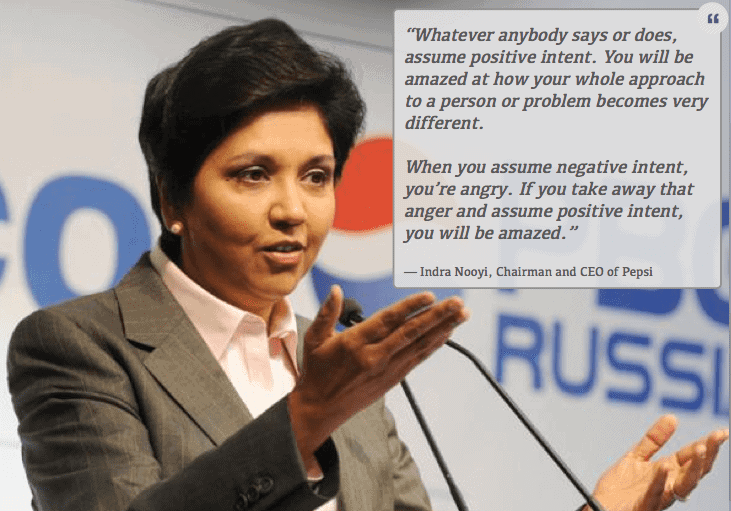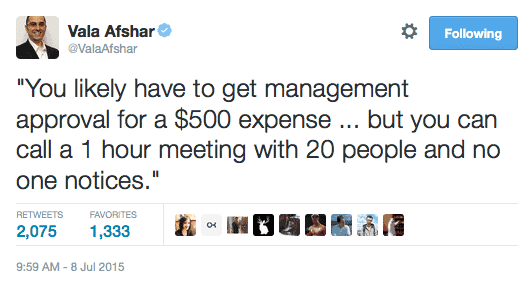It's not easy being a manager. You're often overbooked with meetings, fighting fires, and balancing the needs of your team. When the stress piles up, it can be natural to fall back on instincts and away from good habits that generate positive results.
With a shortage of time, the question becomes how to be a better manager now, not when you have time to read that pile of books in the corner, or that all-day training you keep putting off. I've read many of those books and learned from some expert managers along the way, so today I'm going to share with you a few of my favorite phrases that have helped me better motivate and lead my teams.
How to be a Better Manager by using 5 Simple Phrases
Like a mnemonic device, remembering the right phrase can help you build and maintain a larger, important habit. It's why we previously wrote about using phrases like, "Manage my expectations" (to improve communication with your team and avoid surprises) and "Eat the Frog" (to focus on completing the biggest, hardest task each day first).
These phrases below are all battle tested and have helped in many areas of leading diverse teams. I've learned these from friends, and experts alike. I hope you'll find at least one you can apply today to your team and if you have others that work for you, please share them in the comments.
1) "...that sounds important to you, let me write that down."
With all the demands of being a manager, you'll quickly find your memory isn't as reliable as it once was. That means taking notes is a critical habit to develop.
When managers forget things, fail to keep their promises, or become disorganized, it hurts not only them, but their entire team. This can cause team members to build up resentment ("I can't believe you forgot...again!") or lose trust ("Why bother? They won't remember what I tell them anyways...") Both are fatal to morale, motivation, and productivity for your team.
Despite this risk, many managers can be afraid to take notes. They worry they'll break the rhythm of a meeting if they pause to write something down, especially in a one on one. Or they think it is the job of someone else to take the notes, which doesn't set a very good example to the team.
Remember: notes help you be consistent, organize your thoughts, and keep your promises. It's also an important signal to your team that you value what they said. As Andy Grove, former CEO of Intel wrote,
"Equally important is what "writing it down” symbolizes…the act implies a commitment, like a handshake, that something will be done.” - Andy Grove
Knowing how important taking notes is, I still find at times I get a little nervous that my team doesn't know I'm paying attention. They could wonder if I'm actually answering email, looking at something else, or just zoning out. That's why one of my go-to phrases is, "that sounds important to you, let me write that down." That makes it clear that I'm listening and I value what they're saying enough to write it down.
2) "...what can we each do by next time to make progress on this?"
It's common for a manager to look at their calendar and see they have way too many meetings. One of the most common, hidden expenses for you and your team, is just how much those meetings really cost you. As Vala Ashafar, CMO of Extreme Networks observes:
If you're going to have a meeting, you should make sure it's productive and worth the time of those attending; even a small meeting with a few people costs hundreds of dollars of employee time. One of the best ways to make a meeting worthwhile is to be very explicit about next steps. That's why one of my favorite questions to end meetings is to say, "What can we each do by next time to make progress on this?"
That simple phrase shifts the mindset of the meeting from a status update, random discussion, or unsettled debate to one where the focus is on actually moving forward. It also creates critical accountability; it's not just next steps, you're saying what *each* person in the meeting can do (including you). You're much more likely to have things actually get done when an individual takes ownership of a task (aka- decide "who's monkey is this?")
You're also tapping into powerful concept psychologists call the "Progress Principle," which simply states:
"Of all the things that can boost emotions, motivation, and perceptions during a workday, the single most important is making progress in meaningful work.”
Whether the meeting is a critical discussion on a major project, a big customer deal, or a one on one with a team member, it's important to find ways to make progress.
Just talking about something or "checking in" doesn't make a situation better, or get you closer to closing that deal. If you instead focus on something happening because of the discussion, you'll not only improve the meeting, but we can see the research shows it will actually make your team happier and more motivated. Who doesn't want that?
3) "Yes and..."
One of the major challenges of leading a team is motivating your people. That can mean making people feel heard, not making them feel like you're shutting them down, or being too negative. One of the quickest ways to unintentionally hurt motivation is by using statements that transition from agreeing with or praising them to adding the condition of "...but".
When you say something like, "that's a great point, but..." you can make people feel like you were merely placating them to get to what you cared about after the "but..." A perfect example comes from the leadership classic, How to Win Friends and Influence People. Imagine you are Johnnie bringing home good grades in all but Algebra class. Which of these versions would make you feel better and more motivated?
Version 1: "We're really proud of you, Johnnie, for raising your grades this term. But if you had worked harder on your algebra, the results would have been better."
Version 2: "We're really proud of you, Johnnie, for raising your grades this term, and by continuing the same conscientious efforts next term, your algebra grade can be up with all the others."
It's a subtle change with a big impact. By switching the "but" for "and", you actually alter the entire second half of the statement from deflating to motivating. In Version 2, the focus is on how to deliver more of what is desired out of Johnnie (hard work and good grades). Meanwhile, Version 1 makes Johnnie feel bad for the only grade that wasn't great, and suddenly the praise in the first half of the statement feels hollow; it's like all his hard work didn't matter and all his parents were focused on was his one shortcoming.
Think about how you can say "Yes, and..." for your team more often and you'll better align what motivates them with what you say. You'll also help encourage creativity when you add to the discussion with an "and" instead of a "but"; it's a secret the improv community has known for years.
4) "...tell me about the last time that happened."
No matter how awesome a team you have, problems will arise that you have to deal with. Whether they're interpersonal issues, a mistake made that impacted customers, or simply a situation a team member wants guidance on, your team will turn to you for help resolving it.
If there's a problem, getting context on the situation can help provide a better solution. It can help remove bias and ensure you don't jump to conclusions, whether you're dealing with two sides of an argument, or just getting to the root cause of a problem.
It's easy for people to jump right to what they think is the answer when they come to you. Rather than jumping right into it, pausing and learning more can help everyone.
One of my favorite ways to do that is to say, "...tell me about the last time that happened." By returning to that moment, you can unearth more details that can help get to the root cause of the situation. It can also make it easier to not react too harshly, especially when you haven't heard all sides. As Indra Nooyi, CEO of Pepsi, says:
When you approach situations with an open mind, assume positive intent, and ask questions to learn the full story, you're much more likely to resolve issues effectively. Not only does this help you be a better manager, it builds trust with your team in your abilities to lead them through problems.
5) "...together..."
Yes, our final phrase is actually just a single word. Just like "yes, and..." can change how feedback and suggestions are received, using the word "together" more often can also positively impact your team. A study by Stanford researchers Priyanka Carr and Greg Walton showed:
"Participants in the psychologically together category worked 48% longer, solved more problems correctly, and had better recall for what they had seen.
They also said that they felt less tired and depleted by the task. They also reported finding the puzzle more interesting when working together, and persisted longer"
All it took to make people work harder and better was to suggest that they were working together with others, and at some point they could be helped by a colleague (but actually never were helped).
A feeling of isolation will hurt your team's effectiveness. Use the power of the word "Together" to ensure they don't feel that way and experience the benefits that come with it. Of course, actually helping foster collaboration on your team and building a culture of working together will only help further.






